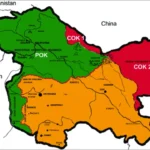The arrest of popular social media personality and content creator Sharmishta Panoli has ignited a heated political firestorm across India, drawing reactions from influencers, politicians, and free speech advocates. What began as a legal matter has rapidly evolved into a national debate about civil liberties, political expression, and the growing influence of digital creators in shaping public opinion.
The Arrest: What Happened?
Sharmishta Panoli, known for her satirical takes and outspoken views on Indian politics, was detained by authorities late last week under charges related to “promoting public disorder and spreading misinformation.” The exact nature of the alleged offense has not been fully disclosed by law enforcement officials, but early reports suggest the charges stem from a controversial video posted on her Instagram account, where she criticized government policy and called for greater transparency.
Authorities claim the content violated public order laws and contributed to rising tensions during a recent protest. However, Panoli’s supporters argue that her arrest was politically motivated, intended to silence dissent and discourage critical voices in the digital space.
Political Reactions Pour In
The arrest has quickly drawn the attention of political leaders across party lines. Opposition figures condemned the move as an attack on freedom of speech, with Congress spokesperson Aarti Sinha stating, “This arrest sets a dangerous precedent. Are we no longer allowed to question authority in a democracy?”
Aam Aadmi Party (AAP) leader Arvind Thakur also weighed in, calling the arrest “a dark day for India’s democratic values.” He added, “If voicing an opinion lands someone in jail, then every citizen’s liberty is at risk.”
In contrast, members of the ruling party defended the move, asserting that freedom of expression must be balanced with social responsibility. BJP spokesperson Devendra Rana commented, “No one is above the law. If content shared online incites unrest or endangers national stability, legal action is warranted.”
Support from Influencers and the Public
The incident has sparked an outpouring of support from the influencer community and Panoli’s 3.8 million social media followers. Many have taken to platforms like X (formerly Twitter) and Instagram using hashtags such as #FreeSharmishta and #VoicesNotViolence to protest the arrest and demand her immediate release.
Well-known Bollywood actress and activist Dia Kapoor posted: “You may not agree with everything someone says—but defending their right to say it is the heart of democracy. Stand strong, @sharmishta_official.”
Even international observers have taken notice. A statement from Human Rights Watch South Asia expressed concern over what it called “an escalating pattern of suppression targeting digital dissent in India.”
Legal Experts Weigh In
Legal professionals have also entered the discussion, questioning the interpretation of public disorder laws in this case. Senior Supreme Court advocate Priya Deshmukh explained, “The Indian Constitution protects free expression. While there are reasonable restrictions, they must be narrowly defined and clearly justified. Arrests for digital content should be the absolute last resort.”
She added that the ambiguity surrounding Panoli’s charges only deepens concerns about selective enforcement and a lack of transparency in legal procedures involving online speech.
A Bigger Picture: The Power of Digital Voices
Panoli’s arrest underscores a broader trend—the rising influence of social media creators in shaping public discourse and the political landscape. Once limited to entertainment and lifestyle, platforms like Instagram, YouTube, and X have become arenas for civic engagement and activism.
Analysts suggest this transformation is making governments around the world, including India, increasingly wary of the power wielded by online influencers. “This isn’t just about one creator,” said media analyst Rohit Menon. “It’s about the battle for narrative control in a digital-first democracy.”
What’s Next?
As of Monday, Panoli remains in custody pending a bail hearing scheduled for later this week. Her legal team has expressed confidence that the charges will not hold up in court, calling them “baseless and unconstitutional.”
Meanwhile, the debate continues to rage online and in Parliament, with many demanding greater protections for digital expression and clearer guidelines around what constitutes punishable content.
Conclusion
Sharmishta Panoli’s detention goes beyond a routine legal matter—it has become a defining moment that’s sparked nationwide dialogue on democracy, online freedoms, and the evolving role of free speech in India’s digital era.. As the legal proceedings unfold, the country watches closely to see whether justice and liberty can co-exist in the age of algorithms and influence.





